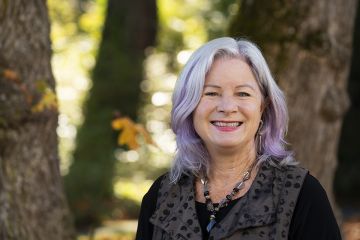Expert Q&A on COVID-19 crisis in India

After a relatively successful handling of the first wave of the COVID-19 pandemic, India is experiencing record numbers of new cases that have overwhelmed the country’s healthcare system and resulted in significant loss of life. UVic political scientist Reeta Tremblay can explain the political and social dynamics at play in this ongoing crisis.
Tremblay was one of four members of an expert panel hosted virtually this week by UVic’s Centre for Asia-Pacific Initiatives (CAPI) for an in-depth discussion on the crisis. Watch the video Info about CAPI events
Q. What is going on in India and what went wrong after India seemed to quite successfully handle the first wave of the virus?
A. The simple answer is complacency on the part of the Indian government and the citizenry in general. With the government boldly pushing its narrative that it had won the COVID-19 battle, India did not plan for the second wave. Thinking that the pandemic was over, it did not secure its own supply of vaccines, resulting in a domestic shortage. Meanwhile, the government allowed gatherings with neither social distancing nor masks. Indians continued to hold weddings, gather en masse in private functions and celebrate major religious functions such as Diwali (November) and the Kumbh Mela festival (January to end of April) which attracts 25 million Hindu pilgrims from all over India to the city of Haridwar.
Furthermore, elections were held in five states in India. With the government’s insistence on the constitutional right of all candidates to campaign unhindered, large public rallies were allowed without social distancing or face coverings.
Q. What is your take on accusations that Indian Prime Minister Narendra Modi has been prioritizing politics over public health?
A. Political factors have remained predominant in the populist Modi government’s response to COVID-19. There was already a hesitancy within the scientific expert community to accept India’s optimistic conclusion of the flattening of the curve during the first wave, in part because of limited testing capacity, under-reporting of deaths occurring in homes and a culture of elites bypassing the rules of screening. During the present second wave, despite cautions in early March from the country’s own national consortium of scientists established to monitor the virus, India’s health minister continued assuring the nation that the COVID-19 situation was under control.
The Hindu nationalist government tries to silence its critics by invoking a populist rhetoric of protecting India’s reputation and representing any challenges to the official discourse as anti-national.
—UVic political scientist Reeta Tremblay, a research associate with UVic’s Centre for Asia-Pacific Initiatives which hosted the recent panel discussion on COVID19 and India
The Indian government asked Twitter to remove 52 tweets criticizing the government’s mismanagement of its response to the pandemic, arguing that such sentiment fueled negativity and mistrust. Meanwhile, Modi government ministers have taken to Twitter thanking Modi and his leadership for their handling of the COVID-19 crisis.
Q. Can you speak to the Canadian and international responses to the crisis?
A. The international community has responded resoundingly to India’s ongoing crisis.

Several countries including the US, Canada, Australia, China, Saudi Arabia and within the European Union have supplied oxygen generators, ventilators, the antiviral medication Remdesivir, vaccine raw materials and other medical supplies.
In Canada, the South Asian community is deeply affected by the crisis in India. Yes, the travel ban does create hardship for Indo-Canadian families, but everyone understands the implications of removing travel restrictions when the risk of exposure is so high.
—Tremblay
As White House chief medical advisor Anthony Fauci said this past week, we need a global response to this pandemic. Towards this, it is good to see that the US has announced its support of South Africa and India’s proposal at the World Trade Organization to waive intellectual property protections on COVID-19 vaccines.

Q. So what happened in India, in your opinion?
A. India did handle the first wave of the coronavirus proactively with a very strict countrywide lockdown from March to May 2020, just eight weeks after reporting its first confirmed case.
By the fall, with the economy re-opened, infection rates were well-contained. Indeed, the Indian government boldly declared that it was on course to overcome the virus. As such, by January 2021, India – as the preeminent manufacturer of the Oxford Astra Zenca and Covaxin vaccines – began exporting 66 million doses of vaccines across the world (some sold, some donated as so-called “vaccine diplomacy”). Modi declared that India was acting to “save the world.”
However, just a month later, India began to experience an abrupt and dramatic increase in the number of infections and virus-related deaths. Cases have continued to spike: by May 7, India reported over 400,000 in daily new cases and over 4,000 deaths. According to the WHO, from January 2020 to 9 May 9 2021, the number of confirmed cases in India totaled 22,296,414 with 242,362 deaths – just behind the US and Brazil. The situation is probably much worse as medical experts say actual numbers across the country may be five to 10 times higher than the official tally.
How did we get here? The first orders of vaccines by the Indian government with the Indian manufacturers was only after January 3, 2021, while North America countries, for example, had secured their supplies much earlier. The simple answer is, as I’ve outlined above, complacency on the part of the Indian government and the citizenry in general.
-- 30 --
Photos
Media contacts
Reeta Tremblay (Political Science) at reeta@uvic.ca
Jonathan Woods (Centre for Asia-Pacific Initiatives Communications) at 778-676-4134 or commcapi@uvic.ca
In this story
Keywords: COVID, international, politics, religion, viruses, emergency, government, health, Reeta Tremblay, Social Sciences, Political Science, Centre for Asia-Pacific Initiatives





